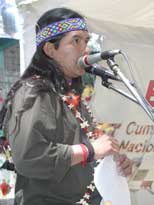 Militarization in Latin America: Latin America under the Gun Militarization in Latin America: Latin America under the Gun
Indigenous delegates describe militarization and ‘paramilitariazation’
By Robin Nieto
Quito - Quietly and painfully, indigenous delegates at the Second Continental
Summit of Indigenous Peoples and Nationalities of the Americas described the
militarization of their regions from Ecuador through Colombia and as far as
Mexico. While the most blatant form of militarization in Ecuador is the U.S.
air base in the coastal city of Manta, delegates here described the effects
of military build-up on their daily life.
Marlon Santi, a 26 year-old native leader from the Amazon region described
how oil exploration has led to increased military presence in direct conflict
with his nation, the Sarayakus. Because of contamination by oil spills and
direct dumping of waste into Amazon waterways by private oil companies, the
Sarayakus have protested the abuse of their traditional land and taken the
consequences for it by the military, police and hired thugs, who Santi says,
are all in the business of protecting oil companies.
According to Santi, four of his community members were imprisoned and tortured
while others were threatened with the same. Their protests against oil companies
have been broken up by thugs and protestors chased away with the threat of
death.
Due to the complete lack of defense for the Sarayaku people, Santi says they
have no choice but to protect themselves. “Every human being has the
right to defend himself. We cannot just cross our arms and let them abuse us.
Any results of future conflicts will be the responsibility of the military,” Santi
said.
And even while the Sarayakus face constant threat, they are being blamed for
the violence by a campaign of disinformation against them even though they
have videotaped evidence of the abuses says Santi.
Santi said there is war of aggression against the leaders of social and indigenous
movements in the country, “they want to cut off the heads of the leaders
of our movement,” Santi said pointing out the assassination attempt against
Leonidas Iza in February, 2004, the leader of the largest indigenous confederation,
CONAIE.
Santi said his own life has been threatened because of his work in opposing
the military presence in the Sarayaku region of the Amazon.
Santi made it clear that the Ecuadorian military is following orders that
comes not only the Ecuadorian government but from international forces defending
the interests of multinational companies. Santi specified Burlington as one
company under protection by the Ecuadorian military.
In neighbouring Colombia, millions of people have been displaced due to continuous
conflict, but as 28-year-old Estefan Valeta, a Colombian delegate said, few
people know that the land vacated by refugees fleeing for their lives, is being
distributed among the same paramilitaries responsible for driving them out.
“There is currently a systematic attempt at legalizing the apporpriation
of land owned by refugees by paramilitary leaders,” Santi said.
According to Valeta, the indigenous people of Colombia reject the peace process
underway between paramilitaries and the government of Colombia which they say
will only legitimizes the paramilitaries.
“What I want to stress is that ‘paramilitarization’ is part
of the militarization process. It should never be overlooked,” Santi
said.
In Mexico, Cesar Chavez, 29, says that after NAFTA was ratified, a new phenomenon
began in Mexico not seen before, the rise of paramilitaries with the specific
purpose of controlling the native population of Mexico. And when there is paramilitary
violence against native people, Chavez says, it is blamed on intertribal warfare
by authorities. And finally, few people speak about the abuses.
Indigenous delegates from Canada down to Brazil are present at this week’s
indigenous summit in Quito, the capital city of Ecuador. Themes of discussion
from July 21 to the July 25 th include :
1) Land, Natural Resources, Autonomy and Sovereignty
2) Identity of indigenous nations and Intellectual Property
3) The rights of communities, nationalities, and social movements within the
World Social Forum
4) Militarization
5) Gender and the participation of indigenous women
|

